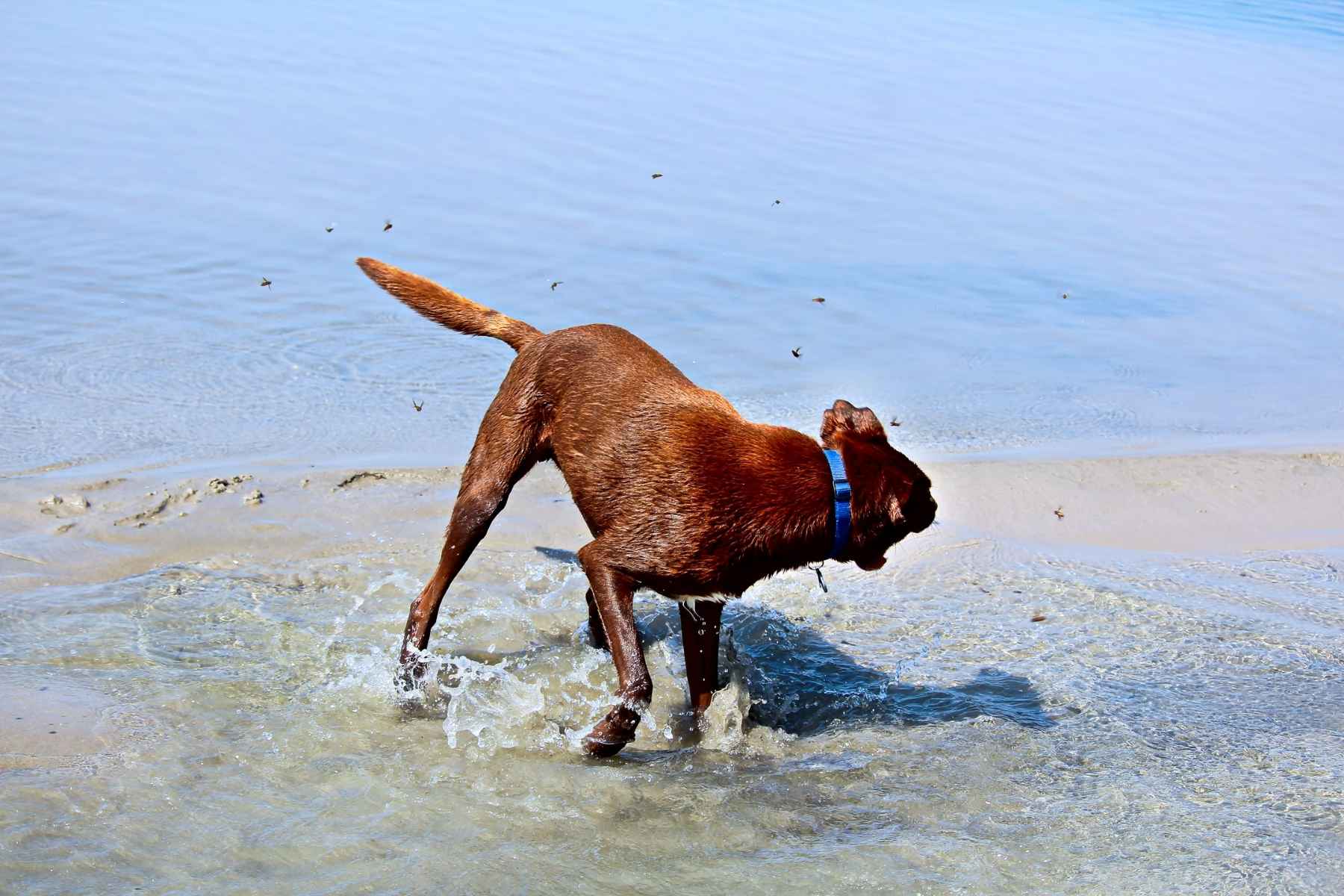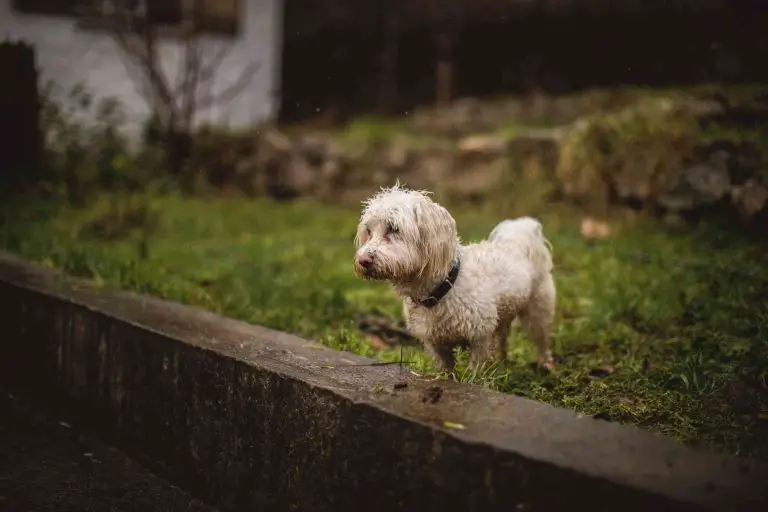Why Is My Dog Scared of Flies?

Have you ever noticed your dog displaying anxious, nervous, or fearful behaviors in the presence of flies? If so, your pooch may have a phobia or mild fear of flies, which is not uncommon and treatable with the right approach.
The most common reasons dogs are scared of flies include associations of flies with their traumatic pasts and traumatic experiences getting bitten or stung by insects. Dogs also have sensitive hearing, which makes the buzzing of flies overwhelming to them.
Keep reading to learn about more of the reasons that dogs become fearful of flies and why bugs can be so upsetting to them. We’ll explain in detail and follow up with answers to frequently asked questions. Now, without further ado, let’s get into it!
Why Is My Dog Scared of Flies?
In dogs, fearful and anxious responses are pretty common, and they aren’t necessarily a sign of doom. Like humans, canines respond to stressful situations and sounds to protect themselves from the outside world.
A study conducted with more than 13,000 Finnish dogs noted that over 30% of canines exhibit a noise sensitivity anxiety-related trait.
Many dogs become anxious and scared around flies and other insects due to the following, which we’ll explore in more detail:
- Dogs associate flies with trauma
- Dogs’ senses are heightened
- Dogs have been stung or bitten in the past
- Dogs aren’t well socialized
- Dogs haven’t learned to deal with the presence of flies
Keep in mind that you can work with your dog on most of these causes for fear of flies. It’s not the end of the world if your dog dislikes flies, but you can save them some stress and discomfort by addressing these causes.
Eventually, you can get them to a point where they can at least tolerate the presence of pesky bugs.
Dogs Associate Flies with Trauma
It’s no secret that dogs that have experienced traumatic situations often develop anxieties and fears of the world around them.
Maybe they’ve been in a past home situation that was dirty, traumatic, and riddled with flies. Or perhaps your rescue pooch spent time in a stressful, cramped shelter cage with many flies.
In either case, they may learn to associate flies with those traumatic experiences. According to a Texas A;M University VetMed article, 5%-17% of dogs are affected by canine PTSD (post-traumatic stress disorder).
Symptoms of canine PTSD include anxious behavior (panting, pacing, whining, barking), avoidance of certain places and things, and hypervigilance. With these symptoms in mind, it’s easy to see why traumatized dogs might come to avoid things that were present in their lives when they were traumatized.
And for your pooch, it might just be that flies are one of those associated things they now try to avoid. If you have a dog that you adopted from a shelter or a problematic past situation, it may be worth speaking to your vet to ascertain whether or not those experiences could have caused a fear of or aversion to flies.
Dogs’ Senses Are Heightened
Another common reason dogs don’t like flies and become fearful of them is that they have a heightened sense of hearing. Have you ever noticed that your dog picks up on the slightest of noises, even hearing things you didn’t hear yourself?
Dogs can literally hear things that human beings cannot because they can hear into higher frequencies (as high as 47,000 to 65,000 Hz). And because of this heightened sense, hearing bugs and flies buzzing nearby will be more intense from their perspective.
Often, dogs discern noises they are or aren’t familiar with as dangerous in a primal effort to protect themselves. This is something that often occurs in other noise situations, such as fireworks or thunder. In those moments, your dog’s brain tries to discern whether or not the surprising noise should be interpreted as dangerous.
But with flies buzzing around, your dog is likely to get agitated and fearful if the noise alarms them or reminds them of something else unsettling.
Dogs Have Been Stung/Bitten
Dogs also develop fears surrounding flies and fly buzzing noises due to bad experiences with flies in the past.
Perhaps your pooch was stung by a bee at one point. This was likely painful and alarming for them, and even if it’s just a fly they’re encountering now, they may not be able to tell the difference between that and a bee.
Or, your dog might have been bitten by a fly in the past. Flies commonly bite dogs in the exposed areas of their skin – areas where there is less fur, such as their bellies. This is quite irritating for dogs and can even become painful if they start licking and chewing the area.
Your dog will likely remember these encounters with flies and insects and go forward associating bugs with pain or irritation.
This is especially true if your dog experienced a bug bite or sting when they were particularly vulnerable like if they were abandoned by a previous owner or they were living as a stray.
Dogs Aren’t Well Socialized
Dogs need to be well socialized in order to adapt to their surroundings and act calmly in new situations. But unfortunately, many dogs don’t get this experience because they’ve either had negative experiences or have spent too much time in isolation.
There’s been a spike in unsocialized dogs that were adopted or born during the pandemic when social isolation was the norm. It may be that, during the pandemic, your dog didn’t even go outside very often. Or perhaps you live in an apartment, so outdoor time is rare for your dog.
If either of these circumstances is the case for your pup, they might not be well-socialized. This could lead to a difficulty adjusting to the presence of flies and other insects.
Dogs Haven’t Learned to Deal
Last but not least, dogs might become fearful of flies simply because you haven’t taught them to get used to them.
As with any new person, thing, or situation, dogs are prone to wariness at first. If you haven’t taught your dog that flies are normal and a non-threat, your dog probably won’t understand this concept.
It takes some time for dogs to get used to flies and the buzzing and noises they make. So, by regularly introducing your pooch to situations where flies might be around, you are helping to expose them to their fears.
Studies on positive reinforcement training have linked the practice to greater effectiveness and better human-dog relationships and dog welfare when compared to negative reinforcement.
Therefore, over time, and with the addition of positive reinforcement for facing their fear, your dog is likely to learn to handle the anxiety. It may even learn to associate flies with a treat if they are used to you rewarding them when they cooperate and put up with flies!
FAQs
Do flies annoy dogs?
In addition to developing fears of flies, dogs may also find flies to be an annoyance. Dogs’ heightened sense of hearing makes the sound of buzzing flies more than a regular nuisance, as they can’t simply ignore the noise as a person can.
Can dogs smell flies?
Dogs have heightened senses of smell, in addition to exceptional hearing. Smell is often seen as the most powerful sense a dog has. It’s possible that they may be able to sense flies with their noses, but it’s more common to sense flies via their ears.
How do dogs react to flies?
Dogs often react to flies by showing annoyance, irritation, or anxiety behaviors. These include, but aren’t limited to, shaking, ear twitching, panting, whining, pacing, and excessive barking.
Can dogs develop phobias of flies?
It’s possible for a dog’s fear to develop into a full-blown phobia, characterized by fear reactivity in irrational situations and anticipation of threatening situations. If your dog is fearful around flies, then without addressing the problem, they might eventually develop a phobia of flies. This could lead to much more intense reactions from them.
Final Thoughts
Have you ever wondered why is my dog scared of flies? If so, you would certainly not be alone, as many dogs are prone to anxieties and fears in a variety of environments.
Whether it’s due to an underlying traumatic experience that the pooch associates with flies, or simply because of their astute sense of hearing, dogs often fear the presence of flies.
Dogs even sometimes see flies and other insects as a potential threat because they’ve been bitten or stung in the past. Or perhaps, your dog has not been well socialized or taught to adapt to new situations in a positive way.
Regardless of the reason, keep in mind that it’s usually still possible to train your dog to tolerate the presence of flies.






